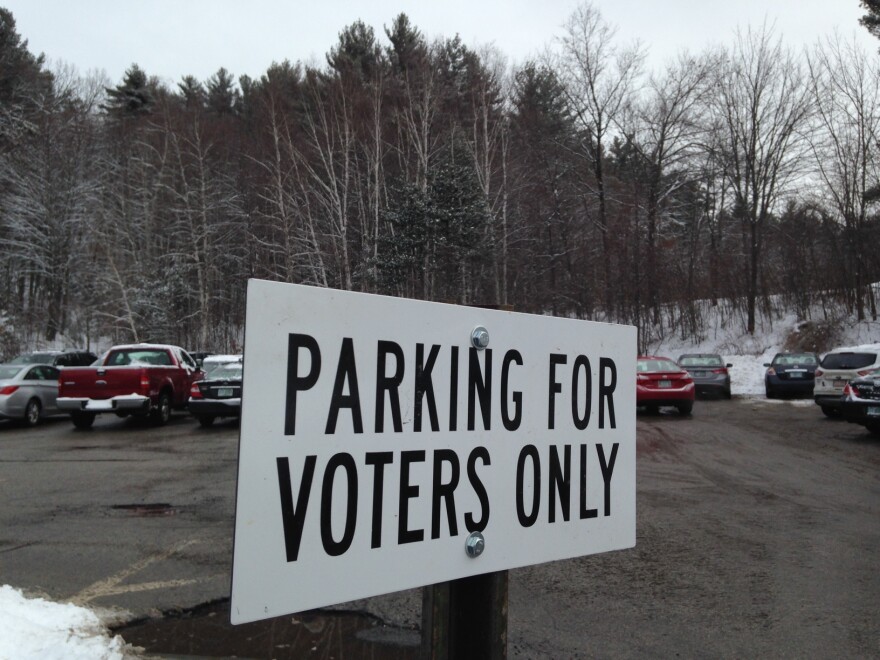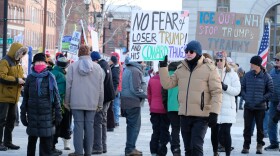While President Trump and some of his allies perpetuated the (unverified and unsubstantiated) idea that out-of-state voters are being sent across the border en masse to throw New Hampshire elections, we were wondering: What can we actually know about the people who are showing up to register for the first time on Election Day?
Thanks to newly released data from the Secretary of State’s office, in response to a public records request from NHPR, we now have a little more clarity.
(Scroll down for a map showing where out-of-state licenses were used among first-time New Hampshire voters in November.)
It’s important to point out that there are a few different kinds of same-day registrants processed in New Hampshire: first-time voters who have never cast a ballot in the state before, returning New Hampshire voters who moved to a new town or ward, and returning New Hampshire voters who had to re-register because their name was removed from the checklist.

In the 2016 general election, according to the Secretary of State's office, Election Day registrants of all kinds made up about 11 percent of all ballots cast. Within that, first-time New Hampshire voters made up 6 percent of all votes in November — and, within that, first-time voters who registered without a New Hampshire driver’s license made up less than one percent.
When people talk about the potential for “voter fraud” in New Hampshire, they often point to the idea that the state allows people to register on Election Day and to use out-of-state licenses. But that alone doesn't mean those voters are doing anything illegal.
There are reasons why someone might legitimately register to vote with an out-of-state license – most obviously, they could have moved to the state recently or could be attending college here. (The state makes clear that out-of-state students attending college in New Hampshire are allowed to vote here, as long as they aren’t also voting in another state.)
To register with an out-of-state license, you still have to prove that you hold domicile in the state – using a utility bill or lease, for example, or by signing an affidavit affirming you actually live where you’re trying to vote. See here for more details on what's required for first-time voters to register in New Hampshire.
According to the data provided by the Secretary of State’s office, 5,903 people newly registered to vote in New Hampshire using an out-of-state license on the day of the last election.
Some other things that stand out from the same-day registrations in November:
- Massachusetts is by far the most frequently used out-of-state license among newly registering voters, accounting for 2,246 (or about 38 percent) of those registrations.
- The Bay State is followed by other nearby states: Connecticut, New York, Maine, Rhode Island and Vermont.
- New Jersey, California, Florida and Pennsylvania round out the top 10 of most frequently-used out-of-state IDs among first-time voters in November. In most cases, these states showed up most frequently in areas around college campuses and could potentially be explained by out-of-state students exercising their legal right to vote here.
- Overall, the towns that see the highest rates of out-of-state IDs used at the polls are all home to college campuses: the University of New Hampshire (Durham, with some spillover in Dover and Portsmouth), Dartmouth (Hanover and Lebanon), Keene State University (Keene), Franklin Pierce University (Rindge), Plymouth State University (Plymouth), Saint Anselm University (near the border of Goffstown and Manchester), New England College (Henniker) and Southern New Hampshire University (Hooksett).
- Otherwise, out-of-state IDs are used all across the state – but only in double- or single-digit numbers. About two dozen people used out-of-state IDs in Laconia, which has a fair number of seasonal homes. One person used a Florida ID to vote in Pittsburg, someone else presented a Maine ID in Waterville Valley and another used a South Dakota ID in Barrington, to name a few.
This data doesn't do anything to prove, on its own, that New Hampshire's elections are being infiltrated and influenced by out-of-state voters trying to game the results.
For one, we don't know the party makeup of each individual first-time voter, nor can we know how they actually cast their ballots.
We do know that college towns have consistently given Democrats a boost, especially in general elections, but we can't definitively say that it's thanks to voters who register using out-of-state IDs — and even if that were the case, those votes would still be legal, under current law, as long as those voters are legally domiciled in New Hampshire when they cast their vote.
It's also worth noting that these patterns could change, depending on the fate of a number of election law bills up for consideration this session: One would add a 13-day residency requirement to vote, while others would try to tighten up the definition of who can claim residency for voting purposes, which could end up curttailing turnout among out-of-state college students or others who are only in the state for temporary periods of time.
If nothing else, the data does offer some more clarity to inform an ongoing conversation about the role of same-day registration in New Hampshire elections.
If you're interested in digging into these numbers more closely, you can check out the breakdown of first-time voters who used out-of-state licenses here, or explore the map below for more details.
Map: New Voter Registrations Using Out-of-State & Mass. I.D. on Election Day 2016
Click on each town to see a breakdown of the numbers.









